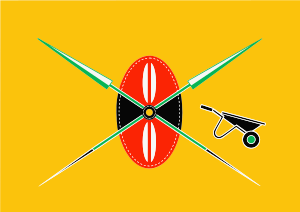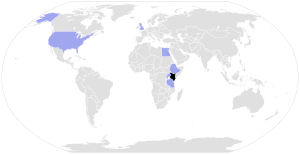William Ruto facts for kids
Quick facts for kids
William Ruto
CGH
|
|
|---|---|
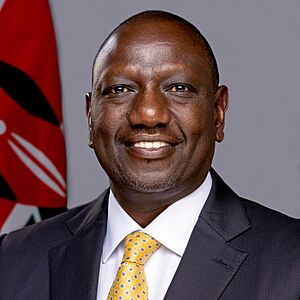
Official Potrait, 2022
|
|
| 5th President of Kenya | |
| Assumed office 13 September 2022 |
|
| Deputy |
|
| Preceded by | Uhuru Kenyatta |
| 11th Deputy President of Kenya | |
| In office 9 April 2013 – 13 September 2022 |
|
| President | Uhuru Kenyatta |
| Preceded by | Kalonzo Musyoka |
| Succeeded by | Rigathi Gachagua |
| Minister for Higher Education | |
| In office 21 April 2010 – 19 October 2010 |
|
| President | Mwai Kibaki |
| Prime Minister | Raila Odinga |
| Preceded by | Sally Kosgei |
| Succeeded by | Hellen Jepkemoi Sambili (acting) |
| 16th Minister for Agriculture | |
| In office 17 April 2008 – 21 April 2010 |
|
| President | Mwai Kibaki |
| Prime Minister | Raila Odinga |
| Preceded by | Kipruto Arap Kirwa |
| Succeeded by | Sally Kosgei |
| Minister for Home Affairs | |
| In office 30 August 2002 – December 2002 |
|
| President | Daniel arap Moi |
| Preceded by | George Saitoti |
| Succeeded by | Moody Awori |
| Member of Parliament for Eldoret North |
|
| In office 29 December 1997 – 9 April 2013 |
|
| Preceded by | Reuben Chesire |
| Succeeded by | Constituency abolished |
| Personal details | |
| Born |
William Kipchirchir Arap Ruto
21 January 1967 Kamagut, Kenya |
| Political party | United Democratic Alliance (2021–present) |
| Other political affiliations |
|
| Spouse |
Rachel Chebet
(m. 1991) |
| Children | 7, including Charlene |
| Residence | State House |
| Education | University of Nairobi (BSc, MSc, PhD) |
| Signature |  |
William Kipchirchir Samoei Arap Ruto (born on January 21, 1967) is a Kenyan politician. He is the fifth and current president of Kenya. He took office on September 13, 2022.
Before becoming president, he was the first elected deputy president of Kenya. He served in this role from 2013 to 2022. He also held several important government jobs. These included Minister for Home Affairs, Minister of Agriculture, and Minister for Higher Education.
Ruto was a Member of Parliament for the Eldoret North area. He served from 1997 to 2013. He first ran for president in 2007 but did not win his party's nomination. In 2013, he became the running mate for Uhuru Kenyatta. They won the election. He was re-elected as deputy president in 2017. In 2022, he successfully ran for president under the United Democratic Alliance (UDA) party.
Contents
William Ruto's Early Life and School
William Ruto is a member of the Kalenjin people. He was born on January 21, 1967. His parents were Daniel and Sarah Cheruiyot. He was born in Sambut village, Kamagut, Uasin Gishu County.
His Education Journey
Ruto started school at Kamagut Primary School. He then moved to Kerotet Primary School. Both schools are in Uasin Gishu County. He passed his primary school exams there.
After primary school, he went to Wareng Secondary School. Later, he attended Kapsabet High School. He completed his high school education at these schools.
He then studied at the University of Nairobi. He earned a Bachelor of Science degree in Botany and Zoology in 1990. He continued his studies there and got a Master of Science degree in Plant Ecology. He later earned a Doctor of Philosophy (Ph.D.) degree from the same university in 2018.
While at the university, Ruto was active in the Christian Union. He was also the chairman of the university's choir. Through his church activities, he met President Daniel arap Moi. Moi later helped him get involved in politics.
William Ruto's Political Career
After graduating in 1990, Ruto worked as a temporary teacher. He taught in the North Rift region of Kenya until 1992. During this time, he also led the local church choir.
Starting in Politics with YK'92
Ruto began his political journey as the treasurer of the YK'92 group. This group worked to help President Moi get re-elected in 1992. This experience taught him a lot about Kenyan politics. After the 1992 elections, YK'92 was disbanded. Ruto then tried to get leadership roles within the KANU party. KANU was the ruling party at that time.
Becoming a Member of Parliament
Ruto ran for a seat in Parliament in the 1997 election. He won, which was a surprise. He beat the person who held the seat before him. That person was Reuben Chesire. Ruto later gained favor with President Moi. He was made the Director of Elections for KANU.
In 2002, he strongly supported Moi's chosen successor, Uhuru Kenyatta. This helped him become an assistant minister. He worked in the Home Affairs (Interior) ministry. Later in the 2002 election, some ministers left to join the opposition. Ruto was then promoted to a full Cabinet Minister. Even though KANU lost the election, he kept his seat in Parliament. In 2005, Ruto was elected as KANU's Secretary General.
In 2005, Kenya held a vote on a new constitution. KANU was against it. Some members of the ruling government joined KANU to oppose the new constitution. They formed a group called the Orange Democratic Movement (ODM). Ruto was a key leader in this group. The ODM group won the vote.
In 2006, Ruto said he would run for president in the 2007 election. He sought to be the presidential candidate for the ODM party. On September 1, 2007, he came in third place. Raila Odinga won the nomination. Ruto then supported Odinga.
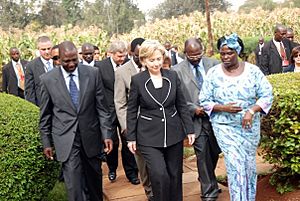
The presidential election in December 2007 had problems. The election commission said Mwai Kibaki won. But Raila Odinga and ODM said they won. Kibaki was quickly sworn in as president. After the election, Kenya faced a period of political unrest. Kibaki and Odinga agreed to form a government together. In April 2008, Ruto was made the Minister for Agriculture. He also remained the Member of Parliament for Eldoret North until 2013.
Ruto was among those mentioned in connection with the 2007/2008 political unrest. However, the legal case against him was later dropped in April 2016.
In April 2010, Ruto's job changed. He moved from the Agriculture Ministry to the Higher Education Ministry. In August 2011, he was no longer a minister but stayed as a Member of Parliament. He then teamed up with Uhuru Kenyatta to form the Jubilee alliance for the 2013 presidential election.
William Ruto's Deputy Presidency
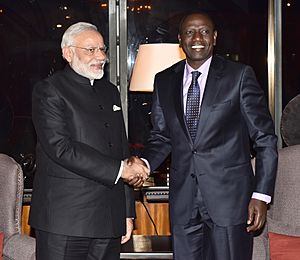
Serving as Acting President
On October 6, 2014, Ruto was named acting president of Kenya. This happened when President Uhuru Kenyatta had to attend a meeting at The Hague. Ruto served as acting president from October 6 to October 9, 2014. President Kenyatta explained that he appointed Ruto to protect Kenya's independence.
In the August 2017 General Elections, Uhuru Kenyatta and Ruto were declared winners. They received 54% of the votes. However, the Supreme Court of Kenya canceled the election results. A new election was held in October 2017. The opposition group did not take part in this new election. Uhuru and Ruto were re-elected with 98% of the votes. The Supreme Court confirmed these results.
Presidential Campaign
In December 2020, Ruto announced his partnership with the new United Democratic Alliance (UDA) party. He was the only presidential candidate to attend the second part of the 2022 presidential debate.
On August 15, 2022, the election commission announced that Ruto had won the presidential election. This was six days after the general election on August 9. He defeated Raila Odinga. Ruto received 50.49% of the votes. Odinga received 48.85%.
Odinga disagreed with the results. He challenged them in the Supreme Court. On September 5, the Supreme Court judges all agreed. They found that Odinga's evidence was not strong enough. They confirmed Ruto as the winner. Odinga said he respected the court's decision, even though he disagreed with it.
William Ruto's Presidency

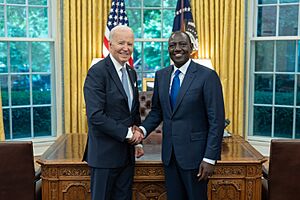
On September 13, 2022, William Ruto became president. The ceremony took place at Moi International Sports Centre, Kasarani. The Chief Justice Martha Koome led the event. More than 20 leaders from other countries attended. The day was made a public holiday. Many people came to the event. Some groups tried to enter the stadium, causing small clashes. However, the event continued peacefully. After his inauguration, he officially began his term as President of Kenya.
After taking office, President Ruto promised to fight climate change. He also pledged to stop using fossil fuels for Kenya's electricity by 2030.
On September 18, 2022, President Ruto made his first foreign trip. He visited the United Kingdom. He attended the state funeral of Queen Elizabeth II on September 19, 2022.
Two days later, on September 21, 2022, President Ruto spoke at the United Nations General Assembly (UNGA) in New York. He talked about "building back better from the bottom upward." He meant including more people in the economy. He also spoke about increasing Africa's representation in the U.N. Security Council. He wanted more investment in Africa. He also stressed working together to fight climate change.
In September 2022, he noted that the Horn of Africa was facing its worst drought in 40 years. He added that 3.1 million people in Kenya alone were affected by the severe drought.
When asked about the Tigray War in Ethiopia, Ruto said that "whatever happens in Ethiopia gets to Kenya." Regarding the Somali Civil War, he stated that "Kenyan troops will come back home as soon as we're done with the assignment that we have in Somalia."
In 2023, Ruto suggested selling off many government-owned businesses. He said it was not good for the economy to keep spending government money on them.
On June 25, 2024, protests against new taxes led to violence. At least five people died. Ruto had proposed several tax increases. This was because more than half of Kenya's tax money goes to paying off debt. The proposed taxes would affect things like car ownership and financial deals.
On July 11, Ruto dismissed most of his cabinet. Only the deputy president and prime cabinet secretary remained. The next day, police chief Japhet Koome resigned. This happened after 40 people died during the Kenya Finance Bill protests in the previous month. Koome was held responsible for police actions against protesters. It was noted that about 60% of Kenya’s collected money goes to paying off debt.
In September 2024, William Ruto and German Chancellor Olaf Scholz signed an agreement. This agreement allows up to 250,000 skilled and semi-skilled workers from Kenya to work in Germany. The agreement also makes it easier to send Kenyans back from Germany. Some people in Kenya are worried about "brain drain." This means professionals like doctors and nurses might leave for better-paying jobs in Germany.
William Ruto's Personal Life
Ruto is married to Rachel Chebet. They first lived in Dagoretti. They had their first child there. They got married in 1991 at the Africa Inland Church. They now have six children.
Ruto is an evangelical Christian. He is a member of the Africa Inland Church.
Ruto owns a chicken farm in his home village of Sugoi. He was inspired by his past job selling chickens. Ruto and his wife built a church on their property in Karen, Nairobi.
Honours and Awards
National Honours
Foreign Honours
| Year | Country | Order | |
|---|---|---|---|
| 2023 | Order of the Green Crescent of the Comoros (Grand Cross) | ||
| 2024 | Order of the Star of Ghana (Companion) | ||
| 2024 | Amílcar Cabral Medal |
Images for kids
See also
 In Spanish: William Ruto para niños
In Spanish: William Ruto para niños
- Presidency of William Ruto
- List of heads of state of Kenya
- 2022 Kenyan general election
 | Shirley Ann Jackson |
 | Garett Morgan |
 | J. Ernest Wilkins Jr. |
 | Elijah McCoy |


